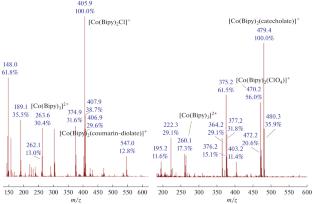Influence of the Eliminated Ligand Structure on the Reduction Rate of the Cobalt(III) Complexes
IF 1.1
3区 化学
Q4 CHEMISTRY, INORGANIC & NUCLEAR
引用次数: 0
Abstract
The reduction of the heteroleptic cobalt(III) complexes with bipyridine ligands of different structures of the model drug molecule is studied by in situ NMR spectroscopy. The nature of the ligand eliminated during reduction is shown to exert a substantial effect on the reduction rate, which indicates that an optimum amount of cobalt should be chosen for the redox-activated delivery of a certain drug.


消除配体结构对钴(III)配合物还原率的影响
摘要 利用原位核磁共振光谱研究了模型药物分子的不同结构的联吡啶配体还原异性钴(III)配合物的情况。还原过程中消除的配体的性质对还原速率有很大影响,这表明在氧化还原作用下输送某种药物时应选择最佳的钴量。
本文章由计算机程序翻译,如有差异,请以英文原文为准。
求助全文
约1分钟内获得全文
求助全文
来源期刊

Russian Journal of Coordination Chemistry
化学-无机化学与核化学
CiteScore
2.40
自引率
15.80%
发文量
85
审稿时长
7.2 months
期刊介绍:
Russian Journal of Coordination Chemistry is a journal that publishes reviews, original papers, and short communications on all aspects of theoretical and experimental coordination chemistry. Modern coordination chemistry is an interdisciplinary science that makes a bridge between inorganic, organic, physical, analytical, and biological chemistry.
 求助内容:
求助内容: 应助结果提醒方式:
应助结果提醒方式:


